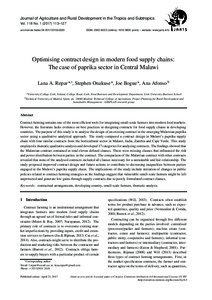Optimising contract design in modern food supply chains: The case of paprika sector in Central Malawi
| dc.date.accessioned | 2017-04-26T09:22:40Z | |
| dc.date.available | 2017-04-26T09:22:40Z | |
| dc.date.issued | 2017-04-21 | |
| dc.identifier.issn | 1612-9830 | |
| dc.identifier.issn | 2363-6033 | |
| dc.identifier.uri | urn:nbn:de:hebis:34-2017031552220 | |
| dc.identifier.uri | http://hdl.handle.net/123456789/2017031552220 | |
| dc.language.iso | eng | |
| dc.publisher | Kassel University Press | ger |
| dc.rights | Urheberrechtlich geschützt | |
| dc.rights.uri | https://rightsstatements.org/page/InC/1.0/ | |
| dc.subject | contractual arrangements | eng |
| dc.subject | developing country | eng |
| dc.subject | small-scale farmers | eng |
| dc.subject | thematic analysis | eng |
| dc.subject.ddc | 630 | |
| dc.title | Optimising contract design in modern food supply chains: The case of paprika sector in Central Malawi | eng |
| dc.type | Aufsatz | |
| dcterms.abstract | Contract farming remains one of the most efficient tools for integrating small-scale farmers into modern food markets. However, the literature lacks evidence on best practices in designing contracts for food supply chains in developing countries. The purpose of this study is to analyse the design of an existing contract in the emerging Malawian paprika sector using a qualitative analytical approach. The study compared a contract design in Malawi’s paprika supply chain with four similar contracts from the horticultural sector in Malawi, India, Zambia and Cape Verde. This study employed a thematic qualitative analysis and developed 17 categories for analysing contracts. The findings showed that the Malawian contract contained in total eleven defined clauses. There were missing clauses that influenced the risk and power distribution between parties in the contract. The comparison of the Malawian contract with other contracts revealed that none of the analysed contracts included all clauses necessary for a sustainable and fair relationship. The study proposed improved contract design and future actions to contribute to decreasing inequalities between parties engaged in the Malawi’s paprika supply chain. The implications of the study include initiation of changes in public policies related to contract farming strategies as the findings suggest that vulnerable small-scale farmers might be left unprotected and generate low gains through supply contracts due to poorly formulated contract clauses. | eng |
| dcterms.accessRights | open access | |
| dcterms.bibliographicCitation | In: Journal of Agriculture and Rural Development in the Tropics and Subtropics. Kassel : Kassel University Press. - Vol. 118, No. 1 (2017) S. 113-127 | |
| dcterms.creator | Repar, Lana Ana | |
| dcterms.creator | Onakuse, Stephen | |
| dcterms.creator | Bogue, Joe | |
| dcterms.creator | Afonso, Ana | |
| dc.description.everything | Gedruckte Ausg. im Verlag Kassel Univ. Press (www.upress.uni-kassel.de) erschienen. | ger |
Dateien zu dieser Ressource
Das Dokument erscheint in:
-
Vol 118, No 1 (2017) [13]

